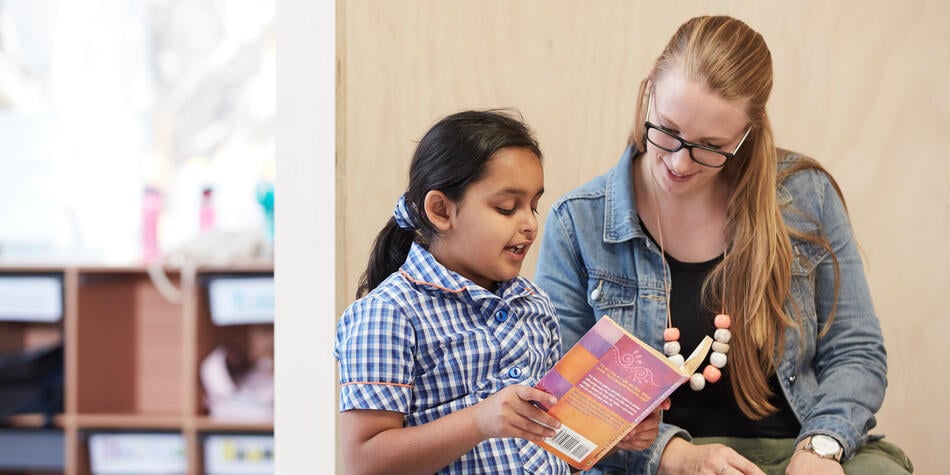So, you want to become a teacher. Perhaps you’re keen to be a high school English teacher, specialise in music or work in early childhood education. Whatever your interest area, you’re passionate about inspiring the next generation of Australians and you’re drawn to the diverse employment prospects of the education industry.
‘To work as a teacher…you need to have university qualifications and be registered with the relevant state authority – then you’re all set to search for a job,’ says Dr Matthew Thomas, Senior Lecturer in the School of Education at Deakin University.
Here’s everything you need to know about how to become a teacher.
What do you need to become a teacher?
You need a university qualification to work as a teacher in Australia. In most states and territories there are two common pathways:
- complete a four-year teaching degree which, depending on where you studied, qualifies you to become an early childhood or primary school teacher and, in some circumstances, a secondary school teacher
- complete an undergraduate degree in a specific discipline like science or music plus a postgraduate teaching degree.
Figuring out what to study at university isn’t always easy and, thankfully, Dr Thomas says one option isn’t better than the other. ‘If you don’t have a degree and you want to be a teacher, the Bachelor of Education is for you,’ he says. ‘If you do have a degree, the Master of Teaching is your ticket to becoming a teacher.’
To ensure the literacy and numeracy standards of all Australian teachers, students enrolling in an education or teaching qualification program are required to successfully complete the national Literacy and Numeracy Test for Initial Teacher Education Students prior to graduation.
Once you have completed your teaching qualification, you’ll need to apply for and maintain teacher registration or accreditation. This occurs with your relevant state or territory body.
And here’s the kicker – you’ll need to maintain your registration for the duration of your teaching career, says Dr Thomas.
‘Schools can’t employ teachers without registration,’ he says. ‘It’s a bit like car rego – there’s a yearly fee and it’s ongoing. You need to keep it up-to-date and pay for it each year. Plus, there are things you need to do in order to keep that registration current, such as completing a certain amount of professional development each year.’
How to become a high school teacher
High school teachers are responsible for teaching students in Years 7 to 12, with children typically aged between 12 and 18. No matter which state or territory you plan to teach in, you’ll need to complete an undergraduate degree, and an accredited teaching degree, such as a Master of Teaching (Secondary). In some instances, it’s possible to fast-track your studies with a combined undergraduate and postgraduate course.
It’s important to note that a Master of Teaching prepares you to teach in the same discipline as your undergraduate degree. ‘Let’s say you’ve done an undergraduate degree in English and drama, then a Master of Teaching,’ Dr Thomas says. ‘You can’t change your mind and decide you want to be a physics teacher – you have to be an English and drama teacher.’
How to become a primary school teacher
Primary school teachers in Australia teach from Kindergarten/Prep/Year 1 through to Year 6, with children typically aged between five and 12. Primary school teachers are required to complete a four-year teaching degree such as a Bachelor of Education (Primary), or if your undergraduate degree is unrelated to teaching, you’ll need to complete a graduate entry teaching degree such as a Master of Teaching (Primary).
Your teaching qualification must include the equivalent of one year full-time studying one of the following key learning areas:
- English
- Mathematics
- Science and Technology
- Human Society and its Environment
- Personal Development, Health and Physical Education
- Creative Arts and Practical Arts.
How to become a kindergarten (or preschool) teacher
Early childhood teachers play an integral role in the development of a child’s language, vocabulary, numeracy and social skills. Due to the vulnerable nature of young children, early childhood teachers often require a specialised qualification, such as a Bachelor of Early Childhood Education or Bachelor of Early Childhood and Primary Education.
The National Quality Framework (NQF) sets the national standard of care for children five years of age and younger who are not enrolled in school, or for primary school children enrolled in out of school hours care. As per the NQF, to work in a centre-based education and care service with children in kindergarten or preschool, you are required to hold an approved diploma-level qualification in education.
You may also be required to complete teacher registration or accreditation depending on the state or territory you wish to teach in.
No matter what type of teacher you aspire to be, Deakin’s education courses prepare you to understand learners and equip you with the leadership skills you need to be a professional educator.

